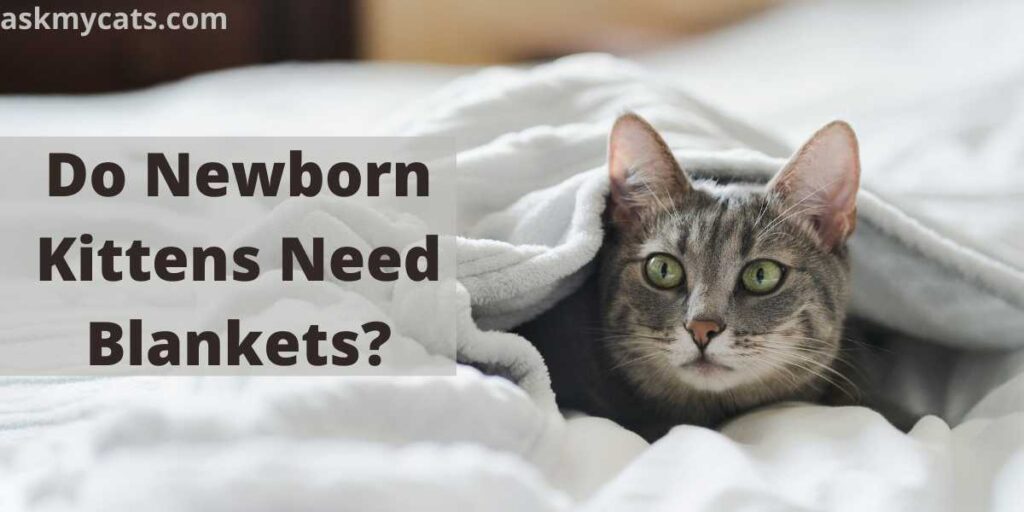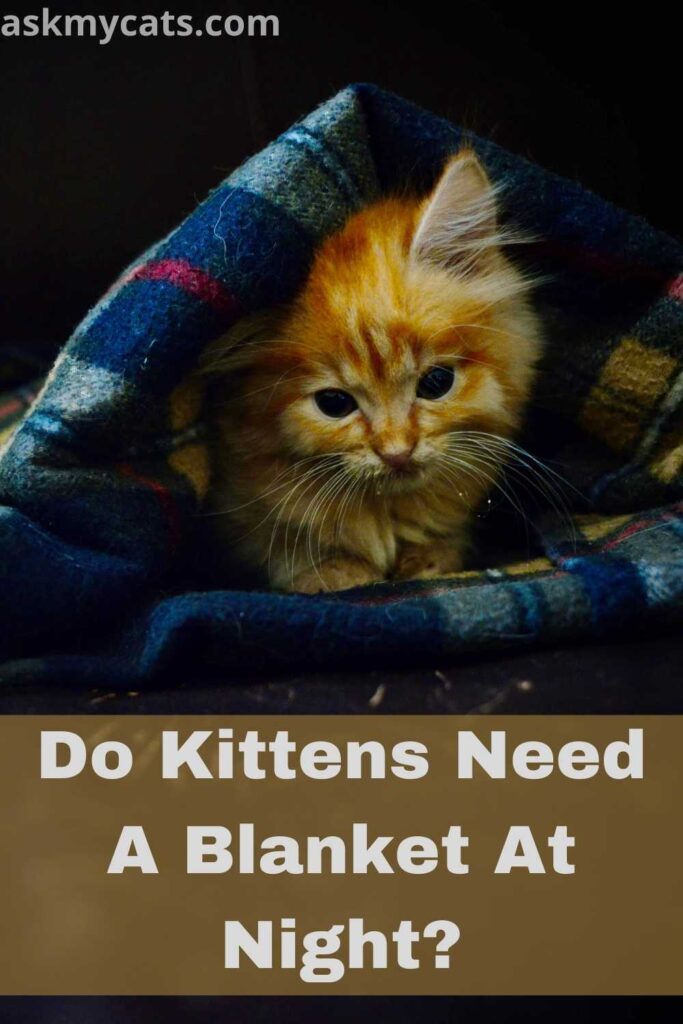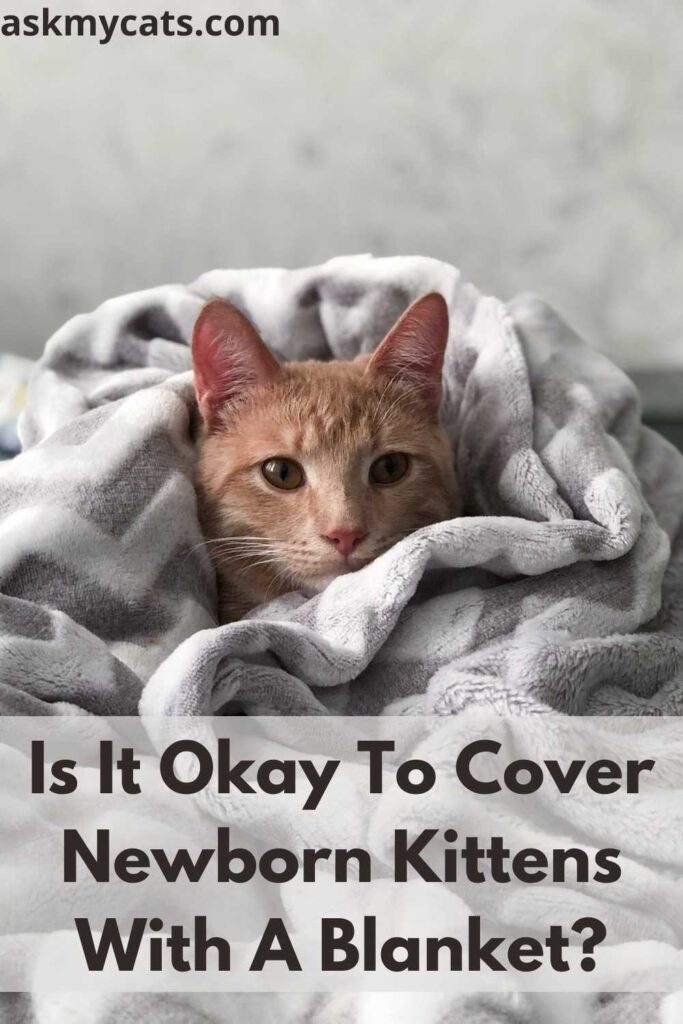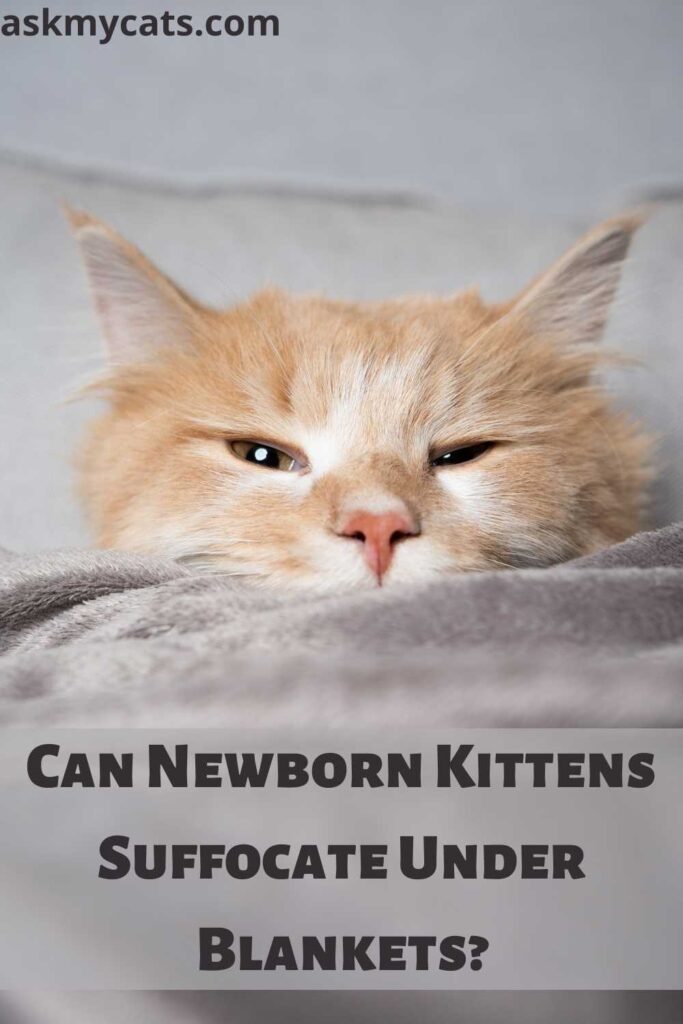Taking care of a brand new fur baby is both a delight and a duty, and it takes a thorough understanding of newborn kitten care.
So, do newborn kittens need blankets?
Yes, newborn kittens need blankets. Newborn kittens are born blind and deaf and must be kept warm at all times. Normally, they would curl up with other kittens in their litter and their mother cat, but you may use soft Blankets as bedding to keep them warm and cozy 24 hours a day, seven days a week.
Keep reading the article to know more about keeping newborn kittens warm.


Give Your Cat the Perfect Day
Get the Free Ebook!
Do Kittens Need A Blanket At Night?
Yes, kittens need a blanket at night.

From birth to the age of four months, a kitten is considered a newborn, giving her adequate time to be weaned from her mother and learn basic life skills like eating and using a litter box.
Whether you’re the primary caregiver for newborn kittens or you’re collaborating with a cat mom, have the essentials on hand to keep your new snuggle bundles in top form.
Kittens are born blind and must be kept safe and warm at all times.
They open their eyes anywhere from seven to fourteen days after birth.
If at all feasible, they’ll curl up with each other and their mother.
Make a soft bed for your hug puddle of cats of all ages out of layered materials like fleece blankets, and consider building a DIY cat bed to fit your love puddle of cats of all ages.
Place the bed in a warm, draft-free spot where other pets or children will not disturb the infants.
Is It Okay To Cover Newborn Kittens With A Blanket?
Yes, it is okay to cover newborn kittens with a blanket.

Delivering a new litter and caring for it can be a difficult undertaking for any mother.
Even while your cat will most likely take excellent care of her kittens, there are several things you can do to assist in the maintenance of a litter and keep them healthy, such as keeping them warm at night by covering them with blankets.
Kittens are unable to maintain their body temperature throughout their first few weeks of life.
Typically, they will snuggle up to their mother for warmth.
You may help by maintaining the queening box between 85 and 90 degrees Fahrenheit for the first five days of its existence.
Electric lamps dangling far from the newborns’ or mother’s inquiring noses, or blankets, perform wonderfully.
Reduce the temperature to roughly 80 degrees on days 5 to 10. Reduce the temperature gradually until the environmental temperature is around 75 degrees Fahrenheit by the end of the fourth week of life.
It’s critical to keep the newborns warm. Chilling has the potential to cause significant disease or even death.
Can Newborn Kittens Suffocate Under Blankets?
Yes, there is a slight chance of newborn kittens suffocating under blankets.

Adult cats are entirely safe to sleep under blankets. Blankets allow enough oxygen to get through, so there is no chance of suffocation.
They will leave on their own if it becomes uncomfortable or too hot.
Young kittens have a difficult time finding their way out from beneath the blankets, so it’s better not to let them sleep there.
Adult cats cannot suffocate in conventional blankets because the majority of cover textiles are permeable and porous.
There is enough oxygen to breathe as a result of this.
If your cat becomes uncomfortable or overheated, they will emerge from under the covers on their own.
Kittens, on the other hand, are a different story. Adult cats have a self-preservation and survival instinct that kittens lack.
To avoid suffocating, it’s preferable not to let them sleep under the blankets because they can’t readily move about and get themselves to safety.
What Should Newborn Kittens Lay On?
Kittens should lay on warn blankets or towels.
Chills are a common occurrence in kittens, and they can be fatal. Keep the kittens warm from the moment you locate them and keep an eye out for indications of cooling (i.e., listlessness and cool to the touch).
If you don’t have anything else on hand, warm up a chilled kitten with your own body heat and gently rub her to promote circulation.
Until they are at least 3 weeks old, newborn kittens are unable to regulate their own body temperature.
It’s also critical to wait until the kittens have completely warmed up before giving them a bottle.
Make a cozy nest at home with a heating pad that is entirely wrapped in a blanket or towel. Ascertain that kittens can escape the heat if they so desire.
Replace the bedding on a daily basis or if they have an accident. If a kitten gets wet, she can get irritable, therefore never submerge a cat in water.
If a kitten needs to be washed, use a washcloth to clean only certain sections of her tiny body. Always use a hair dryer on low and a towel to completely dry your kitten’s hair.
Frequently Asked Questions
How to create a healthy environment for kittens?
It can be difficult to ensure that the babies are healthy and growing unless they are closely observed. Weigh each newborn once a day throughout the first few weeks of life. Keep track of their weights and make sure that each baby is gaining weight steadily. Because the weight changes will be in ounces, their growth should be steady rather than quick. Offer little amounts of wet kitten food when the kittens’ eyes have opened and they are able to walk around. They’ll probably stroll through the food and become a little filthy, so bathing after each meal might be necessary.
Should I groom my kitten?
Brushing your kitten’s coat and clipping her nails are two essential aspects of newborn kitten care, and the sooner you begin, the easier it will be for both of you. Brushing or combing her coat on a regular basis removes extra hair (thus minimizing hairballs) and maintains it clean and shining, while nail cutting reduces the risk of a claw snag.
What are the signs of problems in kittens?
Illness can be diagnosed and treated early with daily monitoring. Any kitten that is losing weight or not gaining weight consistently should be seen by a veterinarian. Crying incessantly might also be a sign of a problem. If the mother is neglecting certain babies, those babies will require your assistance to survive — you may have to remove the neglected babies and raise them alone. Some mothers can tell if their baby isn’t thriving just by looking at him or her. She will forsake these babies rather than spend her efforts caring for them. You should be informed that no matter how diligently you care for these kids, they may not live. A veterinarian inspection is extremely recommended if you observe any concerns or anomalies with the newborns. Each infant will have the highest chance of survival if sickness is diagnosed and treated quickly.
Final Words
Keeping kittens under blankets is necessary as it will keep them warm and cozy, but make sure to not cover their faces as it may cause breathing problems.
If you have any questions, ask us in the comments section.
